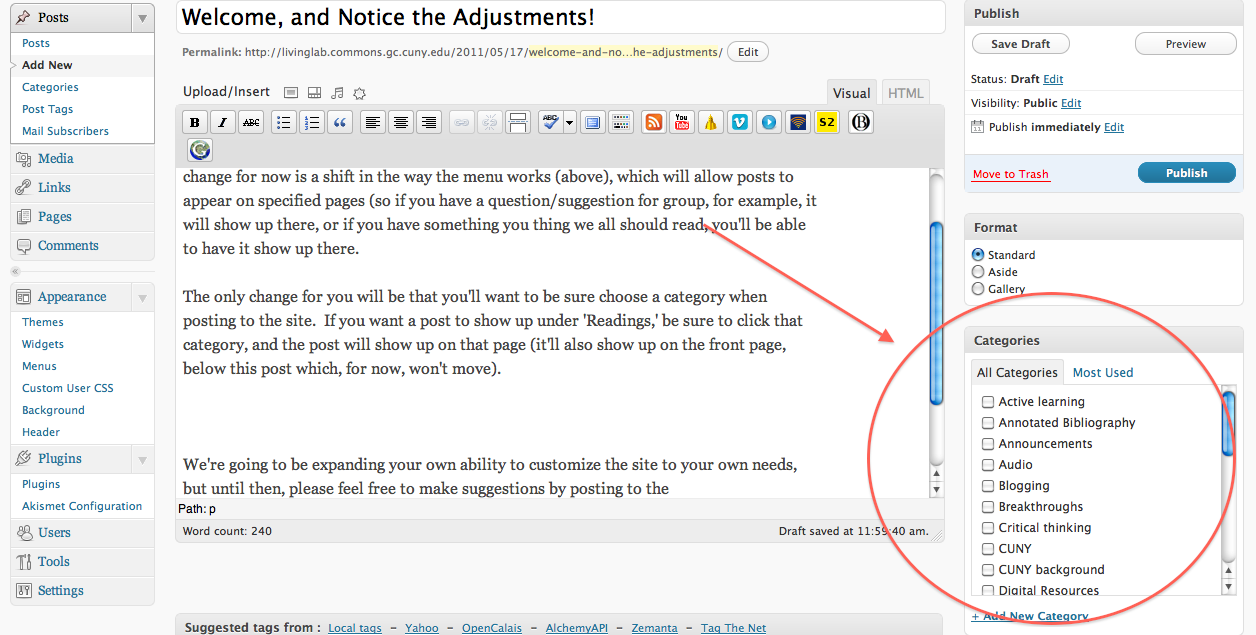Hi all,
If it has been a few hours since you’ve thought about General Education, then you are in luck. For, in this brief blog entry, I’ve assembled a short reading list to bolster your appreciation for popular culture’s understanding of general education.
Magazine media has been bombarding me with education pieces. And so I wanted to share some of what The Atlantic, New York, and the NY Times have to say about subjects that are close to the seminar’s goals and close to our professions.
The Atlantic, June 2011. “Scenes From the Class Struggle,” by Joel Klein. In this article by the ex-chancellor of NY public schools, readers get their hair blown back by the animus against teachers unions, which Klein thinks are the primary reason that students are failing in NYC. I can imagine that The Atlantic’s mailbox will overflow in responses. Two observations: Klein needs to take my composition 1 class so that he can realize the power of research and the need to demonstrate claims rather than simply asserting them. Second, he equates testing with education—as if content, critical skills, and ethics somehow don’t matter.
http://www.theatlantic.com/magazine/archive/2011/06/the-failure-of-american-schools/8497/
New York, May 9, 2011. “The University Has No Clothes,” by Daniel B. Smith. This article discusses two venture capitalists who are against higher education…even though one poor slob went to Cornell and Carnegie Mellon, and the other poor slob went to Stanford and Stanford Law.
http://nymag.com/news/features/college-education-2011-5/
New York, May 16, 2011. “Paper Tigers,” by Wesley Yang. Trying to stop reading this essay is like trying to avert your eyes from a car crash. Messy but compelling. One of the subtexts of this essay is that general education subjects like social and cultural navigation skills have real-world consequences.
http://nymag.com/news/features/asian-americans-2011-5/
The New York Times gives a daily feed of education stories that are useful or frightening or both. Loads of CUNY news combined with stories about how wealthy parents are sending their 3 year-olds to Kumon and then finding that these cherubs (their cherubs) are now worthy of their respect.
http://www.nytimes.com/pages/education/index.html
Don’t forget these books for the summer:
• DIY Education
• In the Basement of the Ivory Tower
• Crisis on Campus
• Higher Education
• Academically Adrift
But I saved the best for last. My favorite writer on education may strike some of you as old-fashioned, but I stand by him. His writing on the meanings and uses of college are still fresh even though he wrote his classic a few years ago. This writer told graduating college students that one must not simply memorize facts and ideas. Instead, one must use these ideas for improving society. In fact, he said that education was meant to be shared because it harnesses students to society and even to nature. For this writer, thinking is a social act that fuses books to minds to people outside of scholarly communities. This writer wrote during a time of tumult and change: technology and commerce were outpacing the humanities, and he wanted to fuse these too often disparate subjects. For indeed, today, teachers and college students are not outside of technology and commerce. This writer believes that the college graduate should be fully enmeshed in life—body and soul—and should not avoid difficult work, no matter if the work is physical or mental or both. Ralph Waldo Emerson wrote “The American Scholar” in 1837. When I think of General Education, I think of Emerson’s call to action.
http://www.emersoncentral.com/amscholar.htm
Peace and City Tech elbow grease,
Sean










